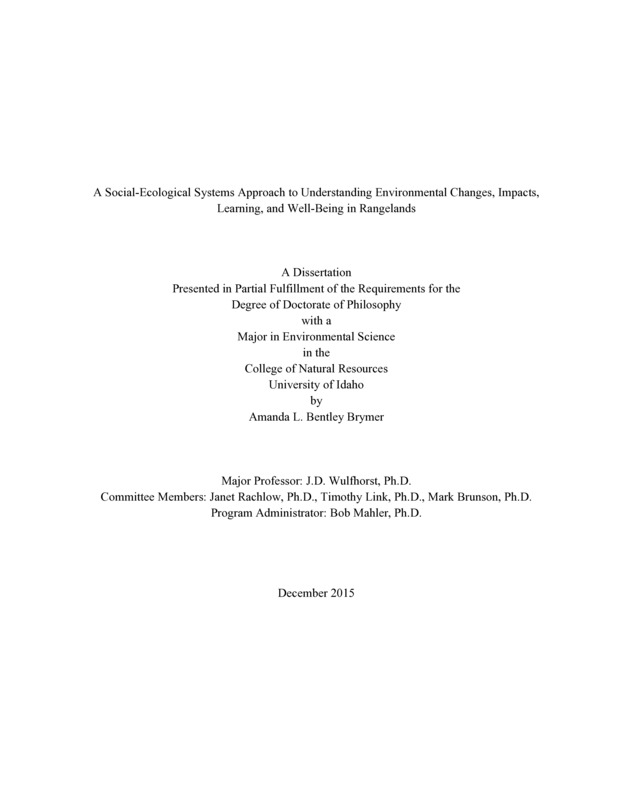A Social-Ecological Systems Approach to Understanding Environmental Changes, Impacts, Learning, and Well-Being in Rangelands
Bentley Brymer, Amanda Leigh. (2015). A Social-Ecological Systems Approach to Understanding Environmental Changes, Impacts, Learning, and Well-Being in Rangelands. Theses and Dissertations Collection, University of Idaho Library Digital Collections. https://www.lib.uidaho.edu/digital/etd/items/bentleybrymer_idaho_0089e_10765.html
- Title:
- A Social-Ecological Systems Approach to Understanding Environmental Changes, Impacts, Learning, and Well-Being in Rangelands
- Author:
- Bentley Brymer, Amanda Leigh
- Date:
- 2015
- Embargo Remove Date:
- 2016-12-16
- Keywords:
- ecosystem services litigation public lands social-ecological systems social learning well-being
- Program:
- Environmental Science
- Subject Category:
- Environmental science; Environmental management; Social research
- Abstract:
-
Rangelands in the western United States are complex systems of dynamic social and ecological change comprising multiple laws and scales of environmental governance. Concepts and theory foundational to ecosystem services provide a useful way of thinking about the ways people benefit from the structure and functions of rangelands, but ignore fundamentally human structure and functions like social system services. Public and privately managed areas face similar ecological drivers of environmental change like the Western juniper expansion, cheatgrass invasion, and wildfire. However, public lands are unique in their management for multiple interests and conservation for future generations. Currently, three key issues stand out for decision-making about public lands: 1) Most assessments of potential impacts from proposed changes to public lands management fail to integrate ecological and socio-economic components and thus fail to fulfill requirements of the National Environmental Policy Act (NEPA), 2) public engagement in planning, assessment, and management of shared resources has been improved with collaborative and deliberative settings that foster social learning, however we know little about how social learning occurs within and between individuals, and 3) in addition to social learning processes, legally-based adversarial processes occur in public lands and natural resource management, however we know little about the role of litigation or the nature of its function within social-ecological systems. To address these issues, our interdisciplinary team developed a participatory social-ecological impact assessment (SEIA) to document perceptions of current and future conditions for human well-being under alternative scenarios of Western juniper removal. The SEIA was conducted during stakeholder workshops for the Bruneau-Owyhee Sage-grouse Habitat (BOSH) project proposed by the Bureau of Land Management (BLM) in southwestern Idaho. The same workshops provided an opportunity to investigate processes of social learning at an individual-scale. Dialogic interactions of workshop participants were analyzed for changes in cognitive, relational, and epistemic understanding. Aside from deliberative workshops, semi-structured interviews were conducted to understand litigation as a social change process and its influence on human well-being. Based on our results, we present an extended SES model that integrates social theory for a more holistic conceptualization of system structures, functions, and relationships.
- Description:
- doctoral, Ph.D., Environmental Science -- University of Idaho - College of Graduate Studies, 2015
- Major Professor:
- Wulfhorst, J.D.
- Committee:
- Link, Tim; Rachlow, Janet; Brunson, Mark
- Defense Date:
- 2015
- Identifier:
- BentleyBrymer_idaho_0089E_10765
- Type:
- Text
- Format Original:
- Format:
- application/pdf
- Rights:
- In Copyright - Educational Use Permitted. For more information, please contact University of Idaho Library Special Collections and Archives Department at libspec@uidaho.edu.
- Standardized Rights:
- http://rightsstatements.org/vocab/InC-EDU/1.0/

